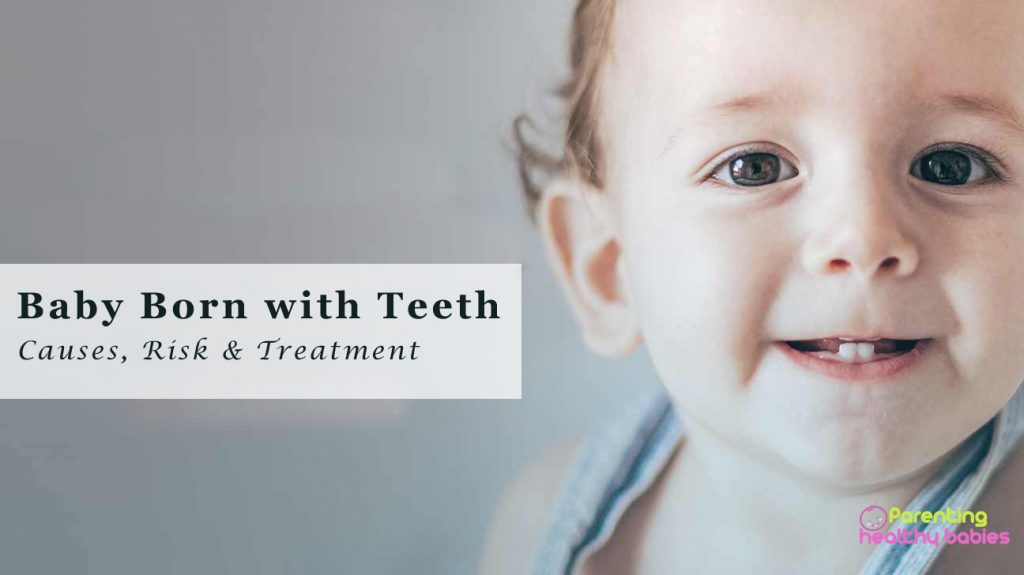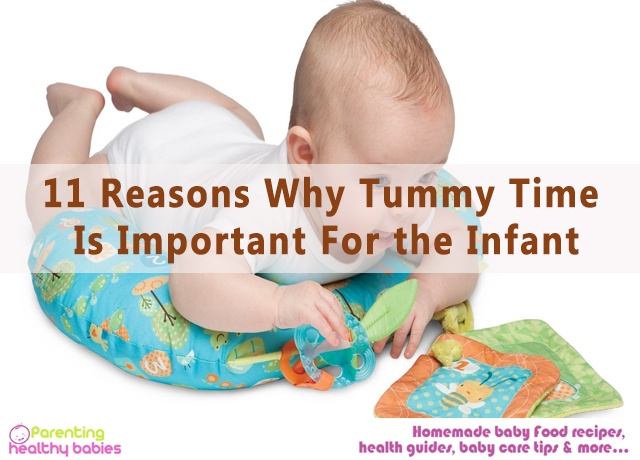Natal teeth or commonly understood as the baby being born with a set of teeth is one such occurrence that may at times put the parents in a lot of stress and tension in regards with the health of the baby. Teething in the baby in the first year after birth is a common and necessary development in the baby to be able to shift from breast milk to solid food. It is crucial for you to understand that though natal teeth are extremely rare yet they are not harmful for the baby as long as they do not interfere with the feeding process or increase the risk of choking in the baby. Natal teeth are generally present in the upper gum line of the baby therefore not so much of a trouble yet they may cause trouble to discomfort to the baby.
The first tooth emerges in the mouth at around 6-7 months of age. Generally, a baby is born without teeth in his or her mouth. Only gum pads in a horseshoe pattern are seen in the upper and lower jaw. But every once in a while, a baby is born with a teeth or two embedded in the jaws. This can be a disconcerting situation for new parents and they you may wonder why this situation has occurred in your baby. These teeth present at birth are most of the time merely baby teeth which have erupted early into the mouth.
Teeth seen in the mouth of a baby may be of 2 types – natal teeth or neonatal teeth. Natal teeth are present at the time of birth in a baby’s mouth. Neonatal teeth are those teeth which erupt in to the mouth during the first one month of life. These natal or neonatal teeth are generally the lower front teeth (mandibular incisors). Teeth present at birth are also called predeciduous teeth, fetal teeth or precocious dentition. These teeth may be normal in size or smaller than normal. In terms of shape, these teeth are conical or malformed. They may be attached loosely or firmly or the underlying gum pad.
Types of baby teeth
To understand more accurately baby teeth are classified as natal and neonatal teeth. The natal teeth are visible from the birth of the child whereas the neonatal teeth occur one month after the birth of the baby. There are multiple risks that are associated with the early eruption of baby teeth as they may cause inconvenience not only for the baby but the mother as wee. Some of the most prominent risk factors associated with natal and neonatal teeth are;
- Pain and discomfort to the child near the gum
- Refusal to suck milk as a result of pain and discomfort
- The mother may also experience pain because of the premature teeth of the baby while breast feeding
- Incessant crying due to hunger and pain
- Increases the risk of fever due to low body strength and immunity in the baby.
- Many cases have been recorded where the family failed to provide adequate love and support to the young one as a result of some age old myth making the child feel abandoned and lonely.
Myths surrounding natal or neonatal teeth (teeth present at or around birth)
There are a number of misconceptions surrounding babies born with teeth in the mouth. Folklore says that these babies bear ill luck or are ‘monsters’. Some people claim that these babies harbor misfortune for the family. These concepts are rooted in misinformation and ages old superstition. An aware parent must take no heed of these misleading tales. A baby with teeth in the mouth at birth is as perfect and special as any other child.
Myths around the world in regards to natal teeth
We all claim to be universally advanced and extremely techno friendly yet at times fail to project our rationality and fall prey to myths and superstitions. Natal teeth are a rare occurrence and have therefore attained many superstitions that ruin the life of the child especially in the countryside and rural areas. Some of the most relevant and believed superstitions around the world are;
- In Malaysia a child born with natal teeth is considered a good luck charm and often the bearer of good fortune for the family.
- In China the natal teeth have a completely opposite relevance for the family. They consider the baby as monster and can go as far as to remove the teeth from the child causing extreme pain and agony to the young one. Refusal of removing the teeth may lead to excommunication from the society.
- In the tribes of Africa many cases have been reported where a child born with teeth at birth has been abandoned by the family or killed considering him as an incarnation of the devil
- Europe a highly civilized and cultured nation is not far behind. People there believe that babies with natal teeth will one day be great leaders.
It is extremely important for all parents to understand that natal teeth are strictly a biological condition that occurs in the child and can be cured through correct treatment if the need be.
Causes, Risk and Treatment for Babies Born with Teeth
So why are babies born with teeth in their mouth? Take a look at causes-
The emergence of natal teeth may be an indication and a reaction of some other problem in the baby and natal teeth become the symptom of the same which demand care and attention for the baby. There are a number of medical conditions that can be blamed for the premature occurrence of baby teeth such as Ellis-van Creveld syndrome, Hallermann- Streiff syndrome, Pierre Robin Syndrome, Soto Syndrome. Babies that are born with a cleft lip have higher chances and probability of having natal teeth in the gum. The exact cause in regards to the occurrence of a natal tooth cannot be estimated but doctors believe that natal tooth may be a reaction of some infection, malnutrition or extreme environmental exposure of the child during pregnancy.
Many times natal or neonatal teeth are present in a baby’s mouth due to hereditary or genetic reasons. This means that a family history of these teeth may be present, such as a parent may also have had a tooth or teeth present in his or her mouth at birth and hence so does the baby. Nutritional deficiencies such as vitamin deficits in the pregnant mother may also be responsible for this condition. Fever during pregnancy due to any reason may also result in teeth in the mouth at birth. Endocrinal or hormonal disturbances affecting a mother during pregnancy may also be a cause.
Children born with certain syndromes or disorders such as cleft lip and palate, congenital syphilis, Ellis-van Creveld (chondroectodermal dysplasia), Rubinstein-Taybi syndrome, steatocystoma multiplex, Pierre-Robin, cyclopia, neonatal progeria may also show teeth in the mouth at birth.
Risks or problems associated with teeth in the mouth at birth
A baby with teeth in his or her mouth may present with certain problems. The most common problem is a loose natal or neonatal tooth. This loose tooth carries the risk of being swallowed. It may also be inhaled during feeding and block the airway. This can be very dangerous for the child. Sometimes, the natal or neonatal tooth has sharp edges and may cause ulcers on the tongue of the baby. The presence of tongue ulcers is called Riga Fede disease in infants. As a result, a baby might refuse to feed due to pain and lose weight. The sharp tooth or teeth may also cause pain to the mother while feeding.
Treatment of teeth present in the mouth at birth
Natal teeth are not generally harmful and are extremely rare in babies. At times they naturally fall off with few months after birth. Whether a natal tooth is troublesome or not all depends on the positioning of the tooth on the gum. If the tooth is present protruding on the gum line it is bound to cause trouble for the mother and child at the time of feeding leading to either irritation or lack of consumption in the baby.
Natal teeth that cause problem to the young one are generally removed by the dentist on the recommendation of the paediatrics but such a step is adopted only if the situation is extremely unmanageable. X-rays generally indicate the severity of the situation and help the dentist plan there next step. It is important to give utmost care and attention to the child and avoid unnecessary trauma to the child which may lead to future troubles.
Thus here was a gist about the rare problem of natal teeth development in the new-borns and the need for parents to treat this condition strictly as medical and biological. All the myths and superstitions with this condition must be disregarded by all parents and immense love and protection should be bestowed on the young angel.
If a natal or neonatal tooth is not causing pain or discomfort to either mother or baby, no treatment is required. However, a tooth or teeth present at birth may need removal or extraction if it is loose and carries the risk of being swallowed or aspirated (inhaled). Another reason for tooth removal may be its sharp edges which cause trauma to the baby and mother both. Tooth removal must be done by a trained pediatric (children’s dentist) and not before the baby is sufficiently mature to withstand tooth removal. In some cases, vitamin K injection may be required prior to tooth extraction. Talk to your child’s dentist about it. If the natal or neonatal tooth is not loose, its sharp edges may be rounded off by the dentist, without tooth extraction.
Natal or neonatal teeth that are present in the baby’s mouth are rarely a cause of alarm and parents should not stress out about it. A timely visit to the pediatric or children’s dentist will help intercept potential problems associated with these teeth.
A baby’s smile is worth more than diamonds! Preserve and protect it!
References
https://www.ncbi.nlm.nih.gov/pmc/articles/PMC3162856/
http://www.pdwg-ng.org/materials/Myths%20and%20misconception%20about%20teething.pdf













